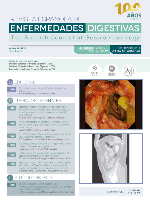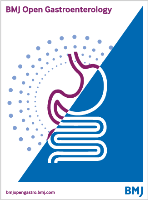
Gastroenterology Report
Scope & Guideline
Fostering Collaboration in Gastroenterology Research and Practice
Introduction
Aims and Scopes
- Clinical Management and Innovations:
The journal emphasizes novel clinical practices and innovations in the management of gastrointestinal diseases, including surgical and endoscopic procedures. - Epidemiology and Disease Surveillance:
Research on the epidemiological aspects of gastrointestinal diseases, including risk factors, prevalence, and surveillance techniques, particularly in relation to chronic conditions such as hepatitis and inflammatory bowel disease. - Molecular and Cellular Mechanisms:
Investigations into the molecular and cellular mechanisms underlying gastrointestinal diseases, including studies on microbiota, genetic factors, and inflammatory pathways. - Therapeutic Advances:
Focus on new therapeutic strategies, including pharmacological treatments, biologics, and emerging technologies like artificial intelligence in gastroenterology. - Interventional Techniques:
In-depth exploration of interventional techniques in gastroenterology, including endoscopic and minimally invasive surgeries, aimed at improving patient outcomes. - Patient Quality of Life and Psychosocial Aspects:
Research on the impact of gastrointestinal diseases on patient quality of life and the psychological aspects associated with chronic digestive conditions.
Trending and Emerging
- Microbiome Research:
An increasing number of studies are exploring the role of the gut microbiome in gastrointestinal diseases, highlighting its influence on health, disease progression, and treatment responses. - Artificial Intelligence and Digital Health:
There is a notable rise in research utilizing artificial intelligence and digital health technologies to enhance diagnostic accuracy and treatment efficacy in gastroenterology. - Personalized Medicine:
The trend towards personalized medicine is evident, with more studies focusing on genetic and molecular profiling to tailor treatments for individual patients, particularly in cancer care. - Non-Invasive Diagnostic Techniques:
Emerging non-invasive methods for diagnosing gastrointestinal diseases, such as advanced imaging techniques and biomarkers, are increasingly featured in recent publications. - Interdisciplinary Approaches:
The journal is seeing more interdisciplinary research that combines gastroenterology with fields like immunology, nutrition, and oncology, reflecting a holistic approach to patient care.
Declining or Waning
- Traditional Pharmacological Treatments:
While still relevant, there has been a noticeable decrease in papers focusing solely on traditional pharmacological treatments for gastrointestinal diseases, as newer therapies and personalized medicine approaches gain prominence. - Basic Science Research:
Research papers focused primarily on basic science without direct clinical implications have become less frequent, suggesting a shift towards more applied clinical research. - Conventional Surgical Techniques:
The frequency of studies on conventional surgical techniques has declined as minimally invasive and robotic-assisted surgical approaches have taken precedence in recent publications. - Descriptive Epidemiological Studies:
There is a reduction in descriptive studies that merely report epidemiological data without deeper analysis or implications for clinical practice. - Single-Center Studies:
The prevalence of single-center studies has decreased, with a growing preference for multicenter studies to enhance the generalizability of findings.
Similar Journals

Indian Journal of Gastroenterology
Empowering the Future of GastroenterologyThe Indian Journal of Gastroenterology, a prominent publication in the field of gastroenterology, is published by Springer India. With roots dating back to 1982 and an ongoing commitment to disseminating high-quality research, this journal serves as a vital platform for researchers, practitioners, and students interested in gastrointestinal health and diseases. It boasts an impressive track record with a Scopus rank of #82 in the gastroenterology category and a 2023 quartile ranking of Q3, firmly situating it within the competitive landscape of medical journals. Although it is not an open-access journal, the Indian Journal of Gastroenterology offers accessible research articles contributing significantly to the field, facilitating informed discussion and advancing knowledge in gastrointestinal medicine. The journal's comprehensive focus covers a wide range of topics from clinical studies to innovative therapeutic approaches, ensuring its relevance to current medical practices and the evolving challenges in gastroenterology.

World Journal of Gastrointestinal Endoscopy
Transforming Insights into Clinical PracticesWorld Journal of Gastrointestinal Endoscopy, an esteemed publication under the BAISHIDENG PUBLISHING GROUP INC, plays a pivotal role in advancing the field of gastroenterology through its dedicated focus on cutting-edge research and innovative practices in gastrointestinal endoscopy. With a commitment to facilitating the dissemination of knowledge, this journal seeks to provide a platform for researchers, clinicians, and academic professionals to share their findings and insights into the latest endoscopic techniques, technologies, and applications. The journal aims to foster collaboration and improve patient outcomes through rigorous peer-reviewed articles that encompass a broad range of topics within gastrointestinal endoscopy. With its impact on shaping clinical practices and influencing future research directions, the World Journal of Gastrointestinal Endoscopy is an essential resource for anyone in the field, remaining accessible through various academic channels, including institutional libraries and individual subscriptions.

Therapeutic Advances in Gastroenterology
Championing the future of gastroenterology.Therapeutic Advances in Gastroenterology, published by SAGE Publications Ltd, is a premier open access journal dedicated to the advancement of knowledge in the field of gastroenterology. Since its inception in 2008 and its transition to open access in 2018, the journal has consistently provided high-quality peer-reviewed research articles, review papers, and clinical studies that address the latest therapeutic advancements and challenges in gastrointestinal medicine. With an impressive impact factor and a 2023 Scopus ranking placing it in the Q1 quartile of gastroenterology journals, it stands as a leading platform for researchers, clinicians, and healthcare professionals. The journal’s commitment to disseminating impactful research has positioned it at the forefront of academic discourse, offering a vital resource for those devoted to improving patient outcomes in digestive health. The United Kingdom-based journal invites submissions that contribute to the understanding and treatment of gastrointestinal disorders, ensuring that cutting-edge findings reach a global audience.

Turkish Journal of Gastroenterology
Pioneering Research for Digestive WellnessTurkish Journal of Gastroenterology is a distinguished publication in the field of gastroenterology, published by AVES in Turkey. With its Open Access format since 2022, the journal facilitates expansive dissemination of research findings, catering to an audience of researchers, healthcare professionals, and students eager to stay abreast of the latest advancements in the field. The journal has maintained a reputable standing with an impressive Q3 category ranking in Gastroenterology as of 2023, recognizing its contributions to expanding knowledge and fostering innovation in gastrointestinal health. Spanning from 1996 to 2024, the Turkish Journal of Gastroenterology commits to publishing high-quality, peer-reviewed articles that engage and inform its audience while addressing key challenges and breakthroughs in the field. The journal's presence in Scopus and its rank of #108 out of 167 in Medicine Gastroenterology further underscore its relevance and increasing impact within the academic community.

REVISTA ESPANOLA DE ENFERMEDADES DIGESTIVAS
Unveiling insights into digestive diseases.REVISTA ESPANOLA DE ENFERMEDADES DIGESTIVAS, a pivotal Open Access journal published by ARAN EDICIONES, S A, has been at the forefront of advancing the field of gastroenterology since its inception in 1990. With a robust commitment to disseminating high-quality research, the journal provides a platform for researchers, clinicians, and students to share innovative findings and insights concerning digestive diseases. The journal is characterized by its Q3 ranking in both Gastroenterology and Miscellaneous Medicine categories, indicative of its significant contributions to these fields, and is positioned within the 36th percentile of Scopus rankings for medicine related to gastroenterology. Based in Spain, REVISTA ESPANOLA DE ENFERMEDADES DIGESTIVAS has embraced the Open Access model since 2004, ensuring that its articles are readily available to a global audience without financial barriers. The journal not only supports academic discourse but also plays a crucial role in improving clinical practices and health outcomes related to digestive health.

BMC GASTROENTEROLOGY
Advancing Gastrointestinal Health Through Open Access ResearchBMC Gastroenterology is a premier open-access journal published by BMC, dedicated to disseminating high-quality research in the field of gastroenterology. Established in 2001 and headquartered in the United Kingdom, this journal aims to enhance the understanding of gastrointestinal disorders through innovative research, reviews, and clinical studies. With an impressive impact factor and ranking within the Q2 category in gastroenterology and miscellaneous medicine for 2023, BMC Gastroenterology plays a critical role in advancing knowledge and practices in the field. The journal's commitment to open access ensures that researchers, professionals, and students worldwide can freely access and share vital findings and insights. Encouraging collaboration and knowledge transfer, BMC Gastroenterology is an essential resource for those dedicated to improving gastrointestinal health and outcomes.

JOURNAL OF GASTROENTEROLOGY
Shaping the future of gastrointestinal research and care.JOURNAL OF GASTROENTEROLOGY, published by SPRINGER JAPAN KK, is a premier academic journal that has been at the forefront of gastrointestinal research since its inception in 1994. With an impressive Impact Factor and ranking in the top quartile (Q1) of its category, this journal holds a significant place in the field of gastroenterology, currently ranked 12th out of 167 in Scopus, placing it in the 93rd percentile. The journal serves as an essential platform for disseminating innovative research, clinical studies, and reviews that foster advancements in the understanding and treatment of gastrointestinal diseases. Although it does not offer Open Access options, it provides researchers, clinicians, and students access to crucial insights and breakthroughs pivotal to improving patient care and outcomes in gastroenterology. With a commitment to high-quality peer-reviewed content, JOURNAL OF GASTROENTEROLOGY plays a vital role in shaping the future of gastrointestinal health and research.

BMJ Open Gastroenterology
Elevating Patient Care with Open Access Gastroenterology ResearchBMJ Open Gastroenterology is a premier open access journal published by the esteemed BMJ Publishing Group, focusing on the dynamic and evolving field of gastroenterology. Established in 2014, the journal has rapidly ascended in stature, reflected in its impressive 2023 Q1 ranking in gastroenterology and its position within the top 25% of journals in the category according to Scopus. With a mission to disseminate high-quality, peer-reviewed research with global significance, the journal provides a vital platform for researchers, professionals, and students alike to share their findings and advancements in gastrointestinal medicine. Operating from its headquarters in London, England, the journal's open access format ensures wide visibility and accessibility of cutting-edge research, making it an invaluable resource for those dedicated to improving patient care and driving innovation in gastroenterological sciences. By engaging with this journal, contributors and readers can stay at the forefront of critical developments in the field, fostering a collaborative environment for knowledge exchange.

Translational Gastroenterology and Hepatology
Transforming Laboratory Insights into Clinical Excellence.Translational Gastroenterology and Hepatology, published by AME Publishing Company, stands as a pivotal platform for advancing the understanding and treatment of gastrointestinal and liver diseases. With its focus on translational research, this journal aims to bridge the gap between laboratory discoveries and clinical applications, thus fostering improvements in patient care. Although specific metrics like H-Index and Scopus ranks are currently unavailable, the journal is committed to maintaining high standards of scholarly communication and excellence. As an open-access publication, it ensures that valuable findings are readily accessible to a global audience, promoting collaboration and innovation among researchers, clinicians, and healthcare professionals invested in gastroenterology and hepatology. The journal's dedication to disseminating groundbreaking research makes it an essential resource for those seeking to stay at the forefront of these ever-evolving fields.

International Journal of Gastrointestinal Intervention
Connecting Global Experts in Gastrointestinal InterventionsInternational Journal of Gastrointestinal Intervention is a distinguished open-access journal published by the SOC GASTROINTESTINAL INTERVENTION that has been committed to disseminating critical research since its inception in 2012. Based in the Netherlands, this journal focuses on the dynamic fields of gastroenterology, hepatology, oncology, and radiology, offering a platform for innovative studies and clinical interventions that can significantly impact patient care and medical practice. With its incorporation into Scopus and ranked within the lower quartiles in various categories as of 2023, the journal acknowledges the evolving landscape of medical research and seeks to continually elevate its contributions to knowledge in these specialized areas. By embracing open access since its founding, the journal ensures that cutting-edge research findings are accessible to a global audience, fostering collaboration and knowledge sharing among researchers, professionals, and students. The journal aims to be a premier source of information and a catalyst for advancements in gastrointestinal interventions, making it an essential resource for those dedicated to improving health outcomes in these critical medical fields.